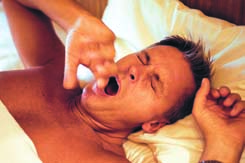What causes insomnia?
Trying to go to sleep when you are tired and not being able to fall asleep can be torture. You don't need to have chronic insomnia to want to find tips on how to get a restful night of sleep. There are things you can do to help even slight sleeping disorders, even if you are anxious and upset and can't “catch a wink of sleep” during the course of a single night.

+ There are a number of factors that may cause you to experience insomnia. Some include:
∎ Stress. When you are anguished by personal problems and depression.
∎ Lifestyle factors. Changes in sleep schedules, staying up all night, problems at work, jet lag, partying, over-long naps and erratic hours.
∎ Environment factors
Noise, uncomfortable bed, soft mattress, hard pillow, light and also extreme temperatures can contribute to sleepless nights.
KEEP A SLEEP DIARY
Keeping track of your daily sleep habits in a diary can help you recognize what factors and/or habits prevent you from getting a restful night of sleep. In the morning, jot down what time you went to bed the night before, how long it took you to fall asleep, if you woke up during the night, what you thought about or if you were worried before going to bed and what you ate at dinner. After 15 days you will have a chart of your common habits and be able to change negative factors.
A POSITION FOR EACH PAIN
- • Poor circulation in the legs and pains during the night. Sleep without a pillow and elevate the mattress at the feet (or foot of the bed) to improve blood flow to the legs.
- • Breathing problems. To relieve breathing problems, the best position is to lie on your side, rather than on your back or belly.
- • Arthritis. Those who suffer from arthritis should rest the affected area on a pillow or padded boxes.
- • Gastric reflex. Avoid sleeping on your stomach. Avoid eating before going to bed. It's best to raise the upper part of the body while resting.
∎ Excessive eating or drinking. Eating foods high in saturated fats before going to bed, the use of alcohol or stimulants can contribute to unrestful sleep.
∎ Over-straining exercise or a sedentary lifestyle. Exercising before going to bed can be a factor to insomnia. While at the same time not getting enough exercise can contribute to not getting a good night sleep.
∎ Bedtime habits. Reading, listening to music, watching television or doing other stimulant activities while in bed can contribute to sleepless nights.
∎ Illness or medical problems. It is not uncommon for people experiencing illness or medical problems to suffer from insomnia. Low sugar levels, thyroid problems, breathing problems, and some medications can cause or exacerbate insomnia.
REM SLEEP
During rem sleep we dream, this process can occur at any stage in the sleeping cycle. In rem , which lasts for short spurts of time, our breathing becomes more rapid, irregular, and shallow, our eyes jerk rapidly in various directions, and our limb muscles become temporarily paralyzed. During rem we relieve daily tensions, thus it is necessary to maintain a healthy mental state.

Comment about this article, ask questions, or add new information about this topic: